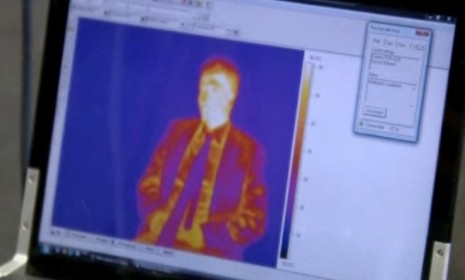The 'thermal camera' that knows when you're lying
The generations-old polygraph test has a sophisticated new rival — and liars can't even tell when it's being used on them

A free daily email with the biggest news stories of the day – and the best features from TheWeek.com
You are now subscribed
Your newsletter sign-up was successful
Liar, liar — face on fire? That's the concept behind a new high-tech lie detector that uses thermal imaging technology to tell when someone is lying. The device was just unveiled by researchers at the universities of Bradford and Aberystwyth in the U.K., and will be tested this fall at an immigration checkpoint in a British airport. Could this be an improvement on the traditional polygraph test, which turns 90 this year? Here, a guide to this innovation:
How does this thermal imaging device work?
With a simple video camera, it spots involuntary changes of expression that can reveal emotions — blinking eyes, wrinkling noses, dilating pupils. But it also uses a high-resolution thermal imaging sensor to detect small changes in temperature around the face that also are common when people lie. "Even swelling blood vessels around our eyes betray us," says Hamish Pritchard of BBC News, "and the thermal sensor spots them too."
The Week
Escape your echo chamber. Get the facts behind the news, plus analysis from multiple perspectives.

Sign up for The Week's Free Newsletters
From our morning news briefing to a weekly Good News Newsletter, get the best of The Week delivered directly to your inbox.
From our morning news briefing to a weekly Good News Newsletter, get the best of The Week delivered directly to your inbox.
Can this technology accurately spot liars?
Sort of. In a test using 40 volunteers asked to answer questions truthfully, then lie, the device caught liars with 70 percent accuracy. The aim is to reach 90 percent accuracy — roughly the rate of a polygraph. Skilled fibbers can still fool the thermal imager, and it can give false positives for people who are simply nervous under interrogation. But the device offers real-time analysis and it can assess the truthfulness of people who don't know they're being tested — potentially significant improvements over old-school lie detectors.
How will this device be used?
Though it was initially developed for immigration and border-control personnel, the thermal imaging technology is expected to be helpful to security and law-enforcement agencies — and that's just the beginning of the possibilities. "It could also be used by marketing companies to assess consumers' reactions to new products," says Clive Cookson in the Financial Times. The technology might even help doctors detect the early stages of Parkinson's and Alzheimer's diseases, both of which affect facial expressions.
A free daily email with the biggest news stories of the day – and the best features from TheWeek.com
Sources: BBC News, Daily Mail, Financial Times